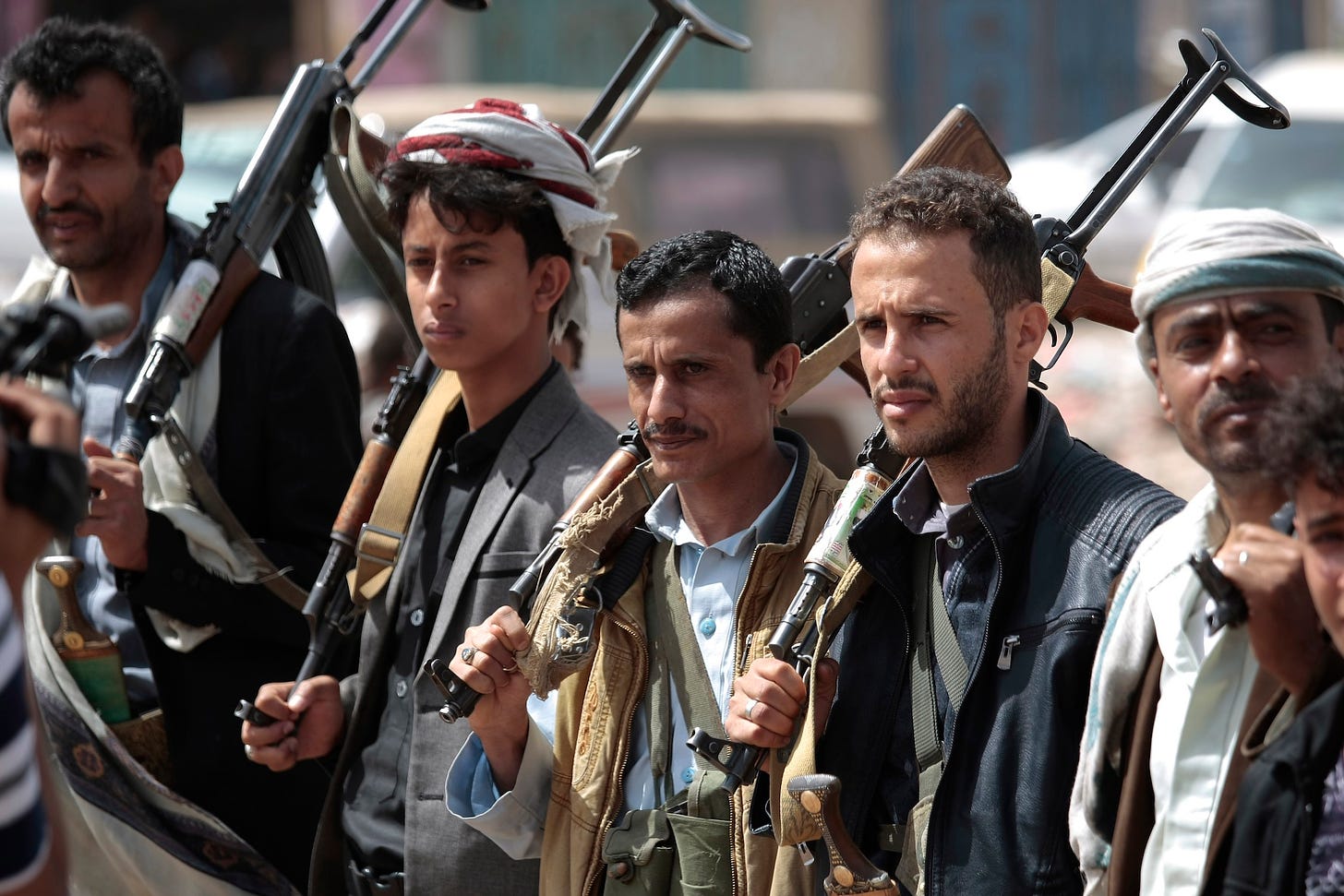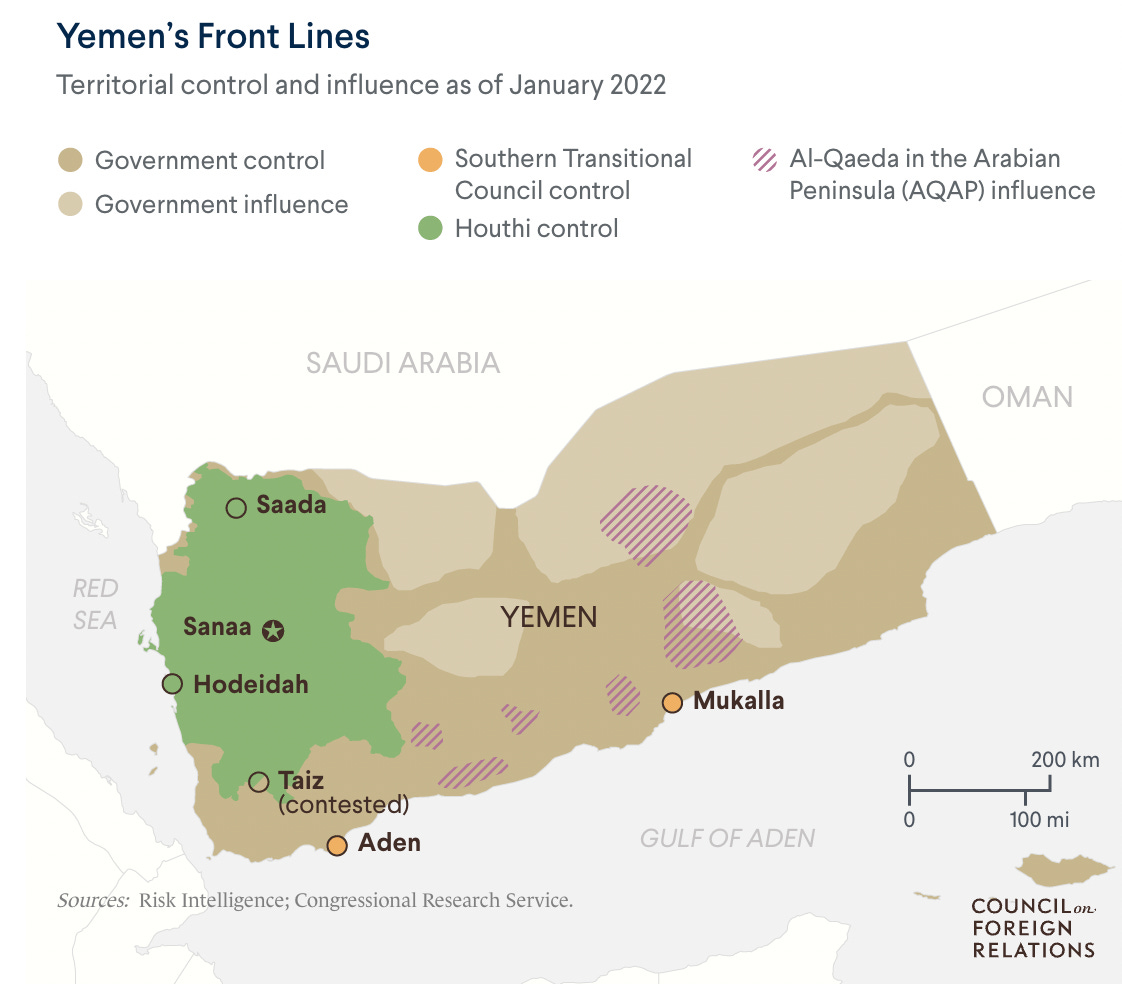FSO Safer: The UN steps in
With conditions on the Safer getting worse, the UN attempts an intervention.
Who’s in charge?
With the Safer firmly into its steady decline, the United Nations attempted an intervention: get access to enable an inspection of the stricken vessel, and then put together a plan to transfer the oil off the Safer and retire it.
The trouble is that there are, broadly speaking, two warring camps in the Yemen conflict they need to deal with:
Houthis - After the Houthis (pictured above) took control of the capital Sana’a in 2014-2015 despite a power sharing arrangement brokered by the UN, then Yemeni President Hadi resigned, was held by the Houthis and fled south to Aden (later ending up in Saudi Arabia).
The Houthis dissolved parliament, installed their own Revolutionary Committee, which later handed over power to the Supreme Political Council.
Now in control of North Yemen (mainly the western half), they are recognised by few in the world, with the notable exception of their backers, Iran (and others such as Syria and North Korea).
Importantly for our story, despite some fierce battles since 2014 and shifting of control of the port, they currently reign supreme in the port of Hodeidah where the Safer resides.
Government of Yemen - After Hadi escaped into exile in Riyadh in 2015, with a Saudi Arabian coalition having militarily intervened in Yemen earlier in the year (and kicked the Houthis out of Aden), he remained as official leader of the internationally recognised Yemen government although rarely appeared in Yemen itself.
Internally, the war raged between the official government and the Houthis, with the official government also facing challenges from the UAE-backed secessionist Southern Transitional Council (STC) In 2019, a power-sharing agreement was entered into with the STC, which has mainly held.
And three years later, in April 2022, Hadi, who over the years would prove to be as much of an ineffective leader abroad as he was at home, with Saudi Arabia by all accounts calling most of the shots and providing a lot of the cash, resigned. In his stead, a Presidential Leadership Council was created between the various anti-Houthi forces, to represent the official Yemen government.
The UN is asked for help
Both sides wrote separately to the UN in March 2018 seeking assistance on the Safer matter. It turned out that, technically, this was not really a task normally in the UN’s remit because of the expertise required and the Safer belonging to a commercial entity. Nevertheless, it got passed onto the Office for the Coordination of Humanitarian Affairs, the Office for Project Services and the special envoy to Yemen. A partial deal was agreed in December 2018 for an inspection and by August 2019 the UN was all set to go, with boats and crew waiting in Djibouti. But the night before, the Houthis sent a text calling it off - because of an unrelated issue.
In March 2020, a joint letter signed by Egypt, Jordan, Saudi Arabia, Djibouti, Yemen and the Sudan was sent to the United Nations Security Council urging them to get the Houthis to open up the Safer for inspection. A July 2020 special session of the UN Security Council was held on the matter and the body has been receiving updates ever since.
Also in July, the Houthis confirmed in writing they would agree to the UN undertaking an inspection but then in October 2020 rejected UN requests for inspections. The next month they seemingly changed their minds and gave permission for the UN to come on board and inspect the latest condition of the Safer, with the visit scheduled for January/February 2021, then supposedly March, but has been delayed continually after that.
Accusations of politics being played by all sides of the Yemen war over the issue have been ever present.
A Memorandum of Understanding is reached
In February 2022, an “agreement in principle” was reached between the UN and the Houthis to implement the first part of the rescue plan - the removal of the oil off the Safer - according to the deputy chief for humanitarian affairs for the UN, Martin Griffiths, after earlier discussions between the Houthis and the Yemen Government.
The next month, a memorandum of understanding was reached between the UN and the Houthis, with the key points below:
The UN to provide a replacement vessel to allow export of the oil currently on the Safer, with a target date of 18 months.
It won’t cost the Houthis any money, but they need to provide “all facilities for the success of the project”.
A temporary tanker to get the oil from the Safer to a temporary vessel (before the permanent tanker is provided) may be required.
The UN will come up with an operational plan.
In my next post, I will summarise the first part of the plan, namely getting the oil off the Safer.




